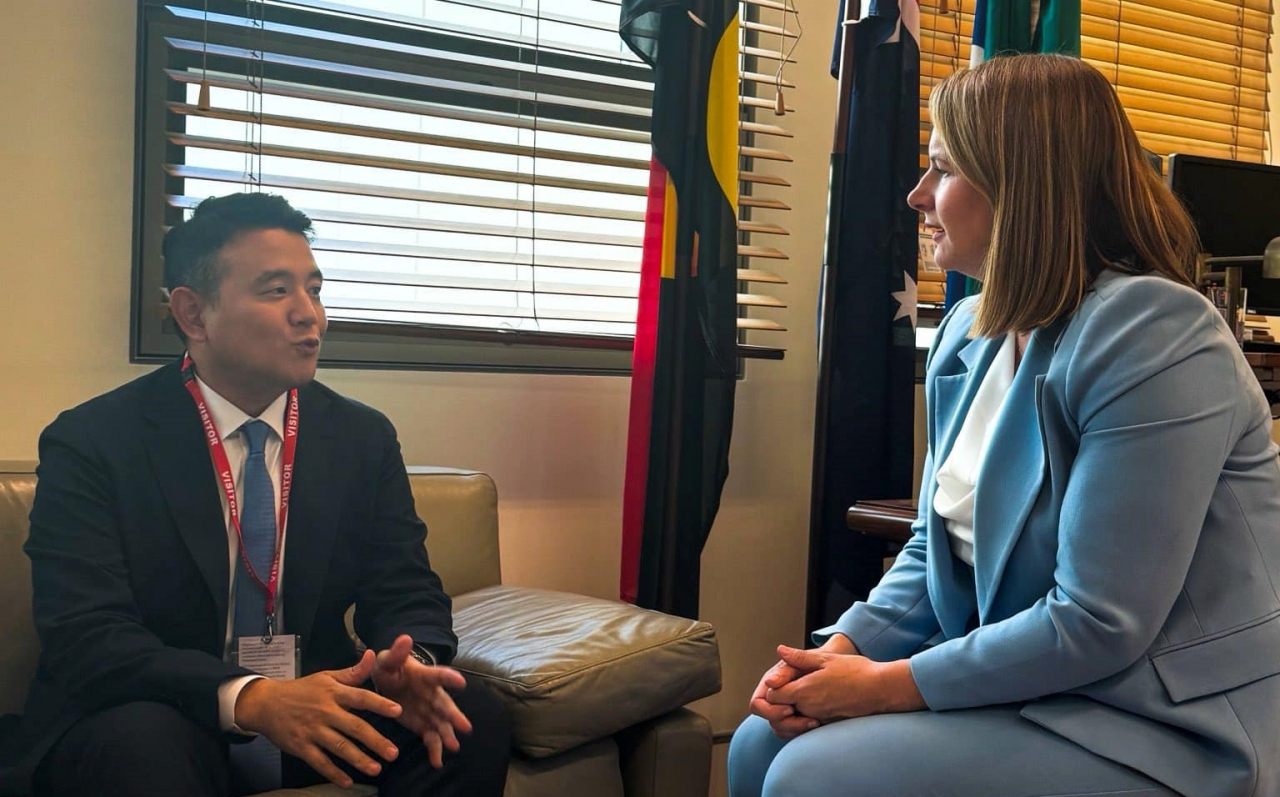 |
Ark Energy CEO Choi Ju-won (left) speaks with Queensland Senator Nita Green on the prospects of the company's energy business in case of a takeover of its parent company Korea Zinc. (Courtesy of Choi) |
The envisioned takeover of Korea Zinc would wreak havoc on its business in Australia because the demands on private equity firms like prospective buyer MBK Partners are incompatible with the long-term requirements of the industry, according to the chief of Ark Energy, Korea Zinc's Australian renewable energy subsidiary.
MBK Partners, a big-name private equity house based in Seoul, recently joined hands with Young Poong to win control of Korea Zinc, the world's largest zinc smelter. Young Poong is a major shareholder and an estranged business partner of Korea Zinc.
Earlier this month, MBK announced it has joined hands with Young Poong to win control over Korea Zinc. It further stated it would secure an additional 14.6 percent stake in Korea Zinc through a tender offer with a budget of up to nearly 2 trillion won ($1.5 billion).
“Even if MBK and Young Poong succeed in taking over management control of Korea Zinc, it will not be easy for them to take on the ongoing business in Australia,” Ark Energy CEO Choi Ju-won, also known as Michael Choi, told The Korea Herald in a phone interview Friday.
Ark Energy is a subsidiary of Sun Metals, Korea Zinc's refinery business in Australia. It focuses on renewable energy, specializing in wind and solar energy generation to provide the electricity needed to power the zinc refinery.
Choi, who doubles as the chief financial officer of Sun Metals, is related to Korea Zinc Chairman Choi Yun-beom. His father is the chairman of Young Poong Precision Corp., a chemical process pump manufacturer under Korea Zinc.
"Zinc smelting is not a business that can yield short-term profit. It requires long-term investments based on technology and personnel training. The renewable energy business requires much more long-term investment as well," Choi said.
"But MBK is a private equity firm that pursues profit through an exit. How can entities such as MBK and Young Poong do what Korea Zinc has done over the years?” Choi said.
Though MBK said it respects Korea Zinc's push to expand renewable energy production in Australia in a press conference held Thursday, Choi remains skeptical.
“Considering MBK would have to look to exit its investment in Korea Zinc in the coming years, it is bound to cut down on expenses,” Choi said.
For Young Poong, Choi said the whole local community is concerned over safety issues.
Three workers who worked at Young Poong’s own smelter died in less than a year. In August, the chief executive officer of Young Poong and another senior staff member were arrested.
“Local politicians and authorities were shocked over Young Poong executives serving a jail term for safety-related deaths. From an Australian perspective, it does not make sense for such an entity to pursue this business,” Choi said.
Sharing Choi’s concerns, Australia-based Townsville Enterprise, a business development representative organization, has called on the Australian government and the Foreign Investment Review Board to block the takeover bid. Sun Metals Zinc Refinery is located in the city of Townsville in North Queensland.
“The FIRB may not be able to block the bid itself, but it could take action by calling for an explanation,” he said.
“Even if the takeover succeeds, MBK and Young Poong are likely to come under tight scrutiny when they apply to renew the operation license of the zinc refinery,” Choi said. According to him, the operator of a zinc smelter has to renew its license every three to four years as the establishment is categorized as a major hazard facility in Australia.
Korea Zinc’s business in Australia takes up roughly 10 percent of the total sales of the company, according to the company's earnings reports. Though the figure may seem relatively small, the company's Australian expansion will be a pivot of Korea Zinc’s future growth, Choi insisted.
“Zinc smelting requires enormous amounts of electricity. The big picture is to produce sufficient renewable energy to power the zinc smelter here. If the production is successful, we will be able to power larger operations and create a virtuous cycle for Korea Zinc and beyond,” Choi said.







